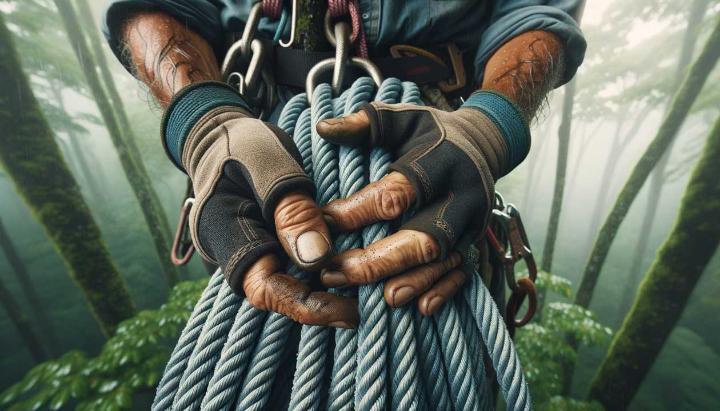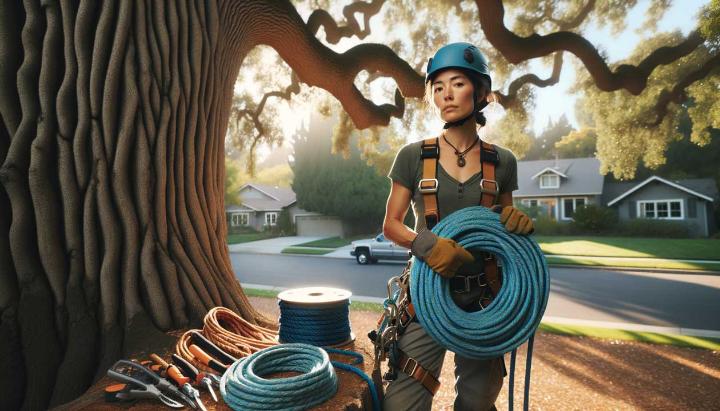Imagine dangling 50 feet above the ground, your life quite literally hanging by a thread. In the world of arboriculture, that thread is no ordinary rope - it's your lifeline. But with countless options flooding the market, how do you choose the best rope for tree rigging that won't let you down?
As a leading manufacturer of high-performance ropes, we at iRopes understand the critical importance of selecting the right rope for tree work. These aren't just any ropes; they're marvels of engineering designed with greater tensile strength to withstand repetitive stretch and the harsh demands of arborist work.
In this guide, we'll unveil our top three recommendations for the best rope for tree work, each tailored to specific needs in the arborist's toolkit. From our top-rated braided polyester arborist rigging rope to the versatile 24-strand bull rope and the lightweight 12-strand climbing rope, we'll explore why these aren't just ropes - they're your partners in safety and efficiency high above the ground.
Ready to elevate your tree rigging game? Let's dive into the world of high-performance arborist ropes and discover why choosing the right one could be the most important decision you make for your next job.
Braided Polyester Arborist Rigging Rope: The Ultimate Guide
When it comes to tree rigging, choosing the right rope can make all the difference between a smooth operation and a potential disaster. As an arborist with years of experience, I've come to appreciate the unparalleled performance of braided polyester rigging ropes. Let's dive into why these ropes are the go-to choice for professionals in our field.
Why Polyester Rope is Ideal for Tree Rigging
Picture this: you're up in a towering oak, preparing to lower a massive limb. The last thing you want is a rope that'll let you down - literally. That's where polyester shines. Its superior strength-to-weight ratio means you can trust it to handle heavy loads without unnecessary bulk. But it's not just about raw strength; polyester's low stretch properties provide the precise control we need for delicate manoeuvres.
I remember a particularly tricky job where we were working near power lines. The stability of our polyester rigging rope gave us the confidence to execute the cuts with pinpoint accuracy. It's moments like these that make you appreciate quality equipment.
Top Features of High-Quality Arborist Rigging Ropes
- Double braided construction offers an excellent balance of strength and handling. The outer braid protects the load-bearing inner core, giving you the best of both worlds.
- Breaking strength is crucial. Top-tier ropes can handle loads from 7,000 to over 20,000 lbs, depending on diameter. Always know your rope's limits and work well within them.
- Abrasion resistance is non-negotiable in our line of work. Polyester stands up to rough bark and sharp edges better than most materials, extending the rope's lifespan.
Choosing the right diameter is essential. While 1/2 inch is common for general use, don't shy away from 5/8 or 3/4 inch for heavier duties. Remember, it's always better to have more rope than you need than to push your equipment to its limits.
Pro Tip: Always inspect your rope before each use. Look for signs of wear, discolouration, or damage. A well-maintained rope is a safe rope!
Have you ever wondered how polyester stacks up against nylon for rigging? While nylon has its place, polyester's lower stretch and better UV resistance make it the preferred choice for most arborists. It maintains its strength even when wet, which is a huge plus in our often damp working conditions.
When selecting your next rigging rope, consider renowned brands like Samson, Sterling, or Yale Cordage. These manufacturers have earned their stripes in the arborist community for producing reliable, high-performance ropes.
Remember, the best rope for tree rigging is one that you can trust with your life - because often, that's exactly what you're doing. Invest in quality, treat it well, and it'll serve you faithfully through countless jobs.
24-Strand Arborist Bull Rope: The Ultimate Choice for Tree Work
When it comes to tree work, having the right rope can make all the difference. As a seasoned arborist, I've had my fair share of experiences with various ropes, but the 24-strand arborist bull rope consistently stands out as a top performer. Let's dive into why this rope is a game-changer for professional tree care specialists.
Key Features of 24-Strand Arborist Ropes
The 24-strand construction of these bull ropes is what sets them apart. Imagine holding a rope that feels both incredibly strong and surprisingly supple in your hands. That's the magic of 24 strands working together. This unique design offers an optimal balance of strength and flexibility, crucial for the demanding nature of tree work.
- Superior strength-to-weight ratio: These ropes can handle loads exceeding 20,000 pounds while remaining lightweight enough for easy handling.
- Exceptional durability: The multi-strand construction distributes wear more evenly, significantly extending the rope's lifespan.
- Enhanced grip: The texture of 24-strand ropes provides excellent grip, even in wet conditions - a feature I've come to appreciate during those inevitable rainy day jobs.

Choosing the Best Bull Rope for Professional Arborists
Selecting the right bull rope for your needs requires careful consideration. Here are some key factors to keep in mind:
- Diameter: Bull ropes typically range from 1/2" to 3/4". Choose based on your specific rigging needs and equipment compatibility.
- Material: While both polyester and nylon are common, I prefer polyester for its lower stretch and better UV resistance.
- Length: Consider the height of trees you typically work with and add extra for rigging setups.
Remember, investing in a high-quality 24-strand bull rope is investing in your safety and efficiency. It's not just about having the strongest rope; it's about having the right tool for the job that you can trust day in and day out.
Pro Tip: Always inspect your bull rope before each use, paying close attention to the entire length for any signs of wear or damage. A well-maintained rope is a safe rope!
In my years of experience, I've found that the versatility of 24-strand bull ropes makes them indispensable for a wide range of tree work tasks. From heavy-duty rigging to precise limb lowering, these ropes have consistently proven their worth in the field. As you continue to hone your skills in arboriculture, remember that your rope is your lifeline - choose wisely, and it will serve you well.
12-Strand Arborist Climbing Rope: The Ultimate Guide
As an experienced arborist, I've climbed countless trees using various ropes, but the 12-strand arborist climbing rope holds a special place in my toolkit. Let's explore why this versatile rope is a favorite among tree care professionals for both climbing and light rigging work.
Choosing the Best Rope for Climbing and Rigging
When it comes to selecting the perfect rope for arborist work, there's no one-size-fits-all solution. However, the 12-strand climbing rope offers a unique combination of features that make it ideal for many situations. Here's why:
- Lightweight and flexible design: The 12-strand construction creates a rope that's easy to handle and manoeuvre, even during long climbs.
- Enhanced climber safety and comfort: The rope's supple nature reduces fatigue and allows for smooth ascents and descents.
- Excellent abrasion resistance: Despite its lightweight design, 12-strand ropes are tough enough to withstand the rough bark and sharp edges encountered in tree work.
- Versatility: These ropes excel in both climbing and light rigging tasks, making them a valuable all-rounder in your gear bag.

Key Features of 12-Strand Ropes for Arborists
What sets 12-strand ropes apart from other options? Let's break down their key features:
- Construction: The 12-strand design creates a rope that's both strong and supple, with a pleasant hand feel.
- Materials: Typically made from high-quality polyester, these ropes offer excellent UV resistance and maintain strength when wet.
- Diameter: Most 12-strand climbing ropes have a 1/2 inch diameter, striking a balance between strength and manageability.
- Breaking strength: On average, these ropes boast a breaking strength of around 8,000 pounds, providing a substantial safety margin.
I remember my first time using a 12-strand rope on a particularly gnarly oak tree. The rope's flexibility allowed me to navigate through tight branch unions with ease, while its strength gave me confidence during some tricky rigging manoeuvres. It's experiences like these that have made me a firm believer in the versatility of 12-strand ropes.
Pro Tip: When using a 12-strand rope for both climbing and rigging, always inspect it thoroughly between tasks. Even minor damage can compromise its safety for climbing.
Whether you're a seasoned pro or just starting your arborist journey, a high-quality 12-strand climbing rope is an investment in your safety and efficiency. Brands like Samson, Teufelberger, and Yale Cordage offer excellent options to suit various preferences and budgets.
Remember, while 12-strand ropes are versatile, they're not suitable for every situation. For heavy-duty rigging, you'll want to switch to a dedicated rigging line with higher breaking strength. Always assess each job carefully and choose the right tool for the task at hand.
For further guidance on selecting the right rope, check out our article on essential guide to selecting mooring ropes for ships and yachts to ensure you have the expertise needed for all your rope-related tasks.
Additionally, if you're looking into specialized ropes for other applications, the best marine braided rope guide can provide insight into tailored solutions for marine environments.
Ultimately, understanding the properties and best uses of different ropes can make a significant difference in performance and safety. Explore our range of rope products to find the perfect solution for your specific needs.
Get Your Custom Tree Rigging Ropes Today
Choosing the best rope for tree rigging ensures a successful and safe operation. Consider the 24-strand arborist bull rope for its exceptional strength-to-weight ratio and excellent grip. For a versatile and lightweight solution, the 12-strand arborist climbing rope is perfect. The top recommendation for pulling trees is the braided polyester arborist rigging rope, known for its superior tensile strength and abrasion resistance. Each of these ropes has unique features tailored to different tree work tasks, providing the reliability and durability needed for professional arborists. To learn more or get a customised solution, fill in the form above, and let us assist you in finding the best rope for tree work.